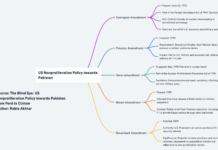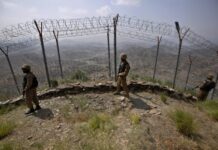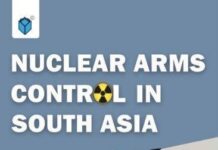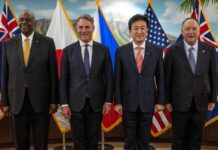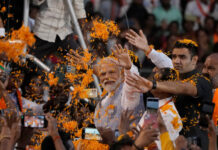Ayesha Abbasi
John F. Kennedy said, “leadership and learning are indispensable to each other.” The arms control regime is presently in a downward spiral mainly because the leaders are no longer paying heed to the lessons they gathered over time. These lessons are seemingly forgotten by the United States, leader of the free world, in its dealings with Russia, especially in the arms control domain.
The Trump Administration is overlooking the lessons of the Cold War which saw the U.S. becoming a party to numerous arms control initiatives to avoid the spectre of a nuclear war with the Soviet Union, and later Russia.
The New Strategic Arms Reductions Treaty (commonly called New START) succeeded the 1991 START Treaty. It was signed by the U.S. President Barack Obama and the Russian President Vladimir Putin in Prague on 8 April 2010, and entered into force on 5 February 2011. The Treaty completes its ten years in 2021, and it stipulates that as long as Presidents of both the U.S. and Russia agree, it can be extended for up to five years beyond 2021 without requiring any approval from the U.S. Senate and Russian Duma. After the recent unraveling of the Intermediate range Nuclear Forces (INF) Treaty, New START was considered as last hope to sustain the arms control regime. Its importance lies in the fact that New START is the first verifiable arms control treaty between U.S. and Russia since START I. As its name signifies, New START limits the number of deployed forces of both the U.S. and Russia to 1550 nuclear warheads over 700 delivery systems, including intercontinental ballistic missiles,submarine-launched ballistic missiles, and bombers. Moreover, comprehensive monitoring and verification provisions allow both states to ensure full compliance with the Treaty.
President Trump has been skeptical of numerous arms control measures from the very beginning. One manifestation of this skepticism came in the form of United States’ withdrawal from the INF Treaty. Similarly, President Trump is not appreciative of the New START either which he termed “a one-sided deal” and a “bad deal” in February 2017. Likewise, the U.S. National Security Advisor, John Bolton criticised the agreement calling it “an execrable deal” implying that it only puts limits on U.S. nuclear arsenal while doing nothing for Russia. Hence, even before it could complete a decade since its signing, the Treaty’s fate is hanging by a thread as the Trump administration remains unwilling to work towards its extension beyond 2021. The U.S. Nuclear Posture Review of 2018 was also silent on New START’s prospective extension till 2026.
On the other hand however, numerous U.S. officials continue to acknowledge the importance of keeping this Treaty in place. General John E. Hyten, Commander of U.S. Strategic Command, has previously argued that verification mechanisms provided under New START allow the U.S. to remain abreast with Russian capabilities and new developments. Similarly, Lieutenant General Jack Weinstein, U.S. Air Force’s Deputy Chief of Staff for Strategic Deterrence and Nuclear Integration, was of the view that this agreement is of “huge value” for American national interest and security.
The issue with such diverging positions within the U.S. is that they complicate things further. For instance, firstly it projects a weaker image of the U.S. abroad, because quite clearly the people in favour of arms control agreements like New START are unable to convince President Trump of the same. Secondly, with President’s approval being the sole requirement for extension of the New START, it highlights that the President’s disapproval could be the sole requirement for non- extension too. Thirdly, there is a huge problem when it comes to this understanding that treaties like New START are one-sided with no repercussions for Russia. This could convince the Trump administration that they are justified in pursuing a quid pro quo approach visà-vis Russia in return for staying in the agreement.
The U.S. in such a situation could expect Russia to fulfil certain obligations which would then ensure the U.S. agreeing to an extension of New START. Any suggestion like this would add fuel to the existing mistrust between both states, while it may also push Russia to bring similar conditions on the table thus adding another roadblock to the negotiations on extension.
U.S. has already lost its leverage by withdrawing from two major bilateral arrangements with Russia in recent years in the form of the Anti-Ballistic Missile (ABM) Treaty and the INF Treaty. Actions like these deteriorate the trust between adversaries that is necessary to sustain stability. If the Russians feel that U.S. may surprise them by continuing to work towards the enhancement of its arsenal — just as it did with withdrawal from aforementioned treaties, Russia will continue to strengthen its own military and nuclear muscle to remain prepared for any untoward surprise.
The verification tools provided under the ambit of New START will come in handy in such a scenario. They act as an important information-gathering mechanism, allowing the U.S. to keep Russian developments in check. In case the New START arrangement breaks down, the U.S. will lose an important instrument i.e. on-ground inspections, to gain real-time insight about the capabilities that Russia possesses or intends to pursue. This cannot be achieved by satellites and other intelligence-gathering tools as they are prohibited to carry out such operations.
Moreover, this transparency also helps prevent both U.S. and Russia from spiralling into an arms race and spending billions of dollars on equipment required to deal with prospective worst case scenarios. Another aspect of transparency comes with the New START provision which obligates both the U.S. and Russia to inform the other about any new weapons under developments which will eventually be counted under the Treaty limits. Repealing New START would also remove this obligation, creating
further uncertainty and hence instability
in the bilateral relations.
Furthermore, Trump Administration’s desire to involve China in arrangements like the INF Treaty and New START does not make sense. Since a major chunk of Chinese arsenal comprises of intermediate range weapons, it would be silly to assume that China would be willing to remove said weapons from its stockpile by agreeing to become party to an agreement like INF Treaty. As far as New START-like arrangement is concerned, neither the U.S. nor Russia will allow China to build up its arsenal to reach the 1550 weapon mark. The duo would not themselves be willing to reduce their own numbers to come down to match China’s stockpile. Hence, calls to get China on-board is merely an excuse to justify removal of the existing shackles placed on nuclear buildup by treaties like the New START and the INF Treaty.
In recent years, there has been a growing interest in nuclear arms build up instead of arms control. The Trump Administration while considering New START has to understand that the U.S. can safely deter and counter Russia with the existing nuclear stockpile that it possesses. This capability will be further augmented by high-end conventional weapons such as the upcoming Prompt Global Strike system when it comes into play. The U.S. does not need to forsake its position as the leading state in the arms control regime. While these arrangements may not completely remove the possibility of war, they do in fact enhance trust between two adversaries thereby acting as an important war prevention tool.
If the New START is not extended, both the U.S. and Russia will be unrestrained in their pursuit of newer weapon systems instead of just modernising the existing stockpiles. The action-reaction syndrome will come into play with the qualitative and quantitative improvements to their respective stockpiles thereby spiralling into an arms race, the likes of which were last seen at the height of the Cold War. Such a scenario would be detrimental not only for the bilateral security arrangements between U.S. and Russia, but the other regional actors as well since nuclear policies and arms developments tend to follow a chain reaction.
Lastly and most importantly, disregard of historic arms control measures like the INF Treaty and New START by the so-called leading states of the world puts the global arms control regime in jeopardy. It also emboldens revisionist actors worldwide to pursue policies of aggression vis-à-vis their adversaries thus making this world a dangerous place to live in.
Ayesha Abbasi is a Research Fellow at Center for International Strategic Studies, Islamabad.



